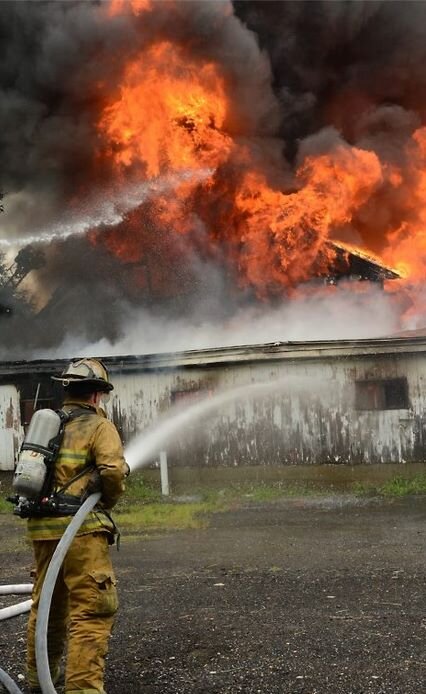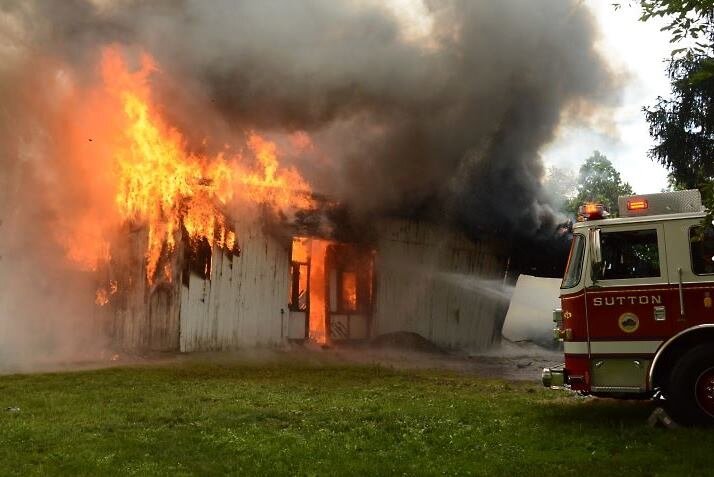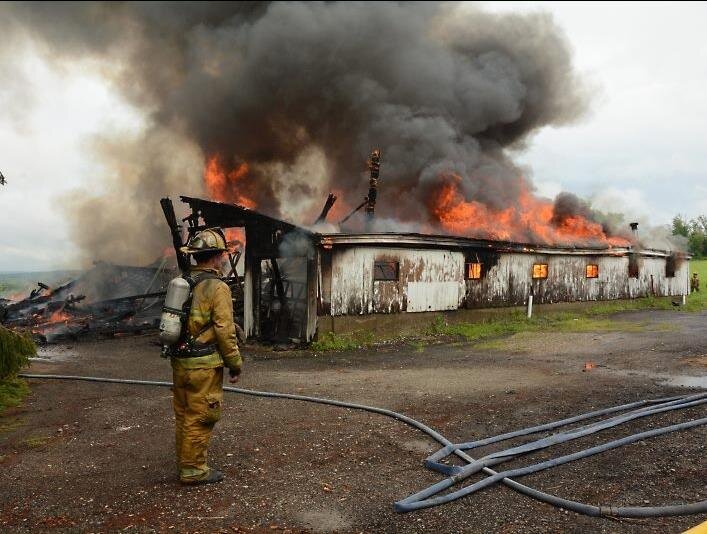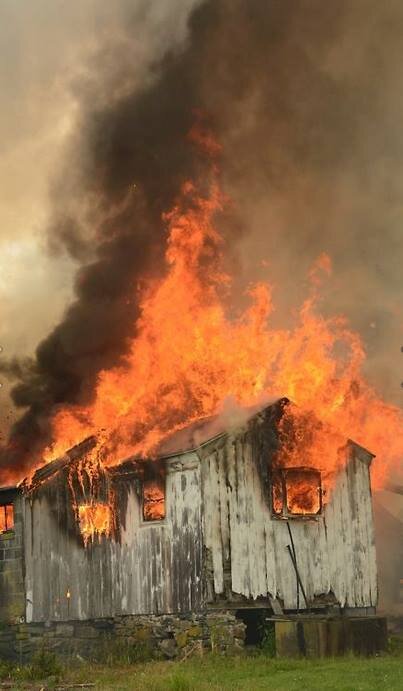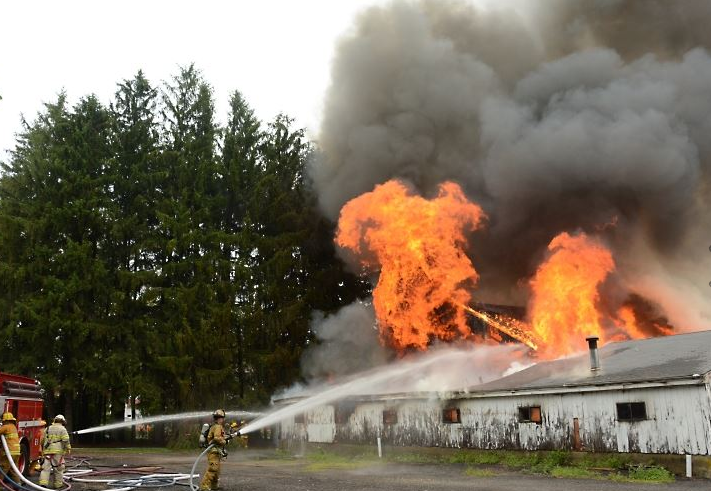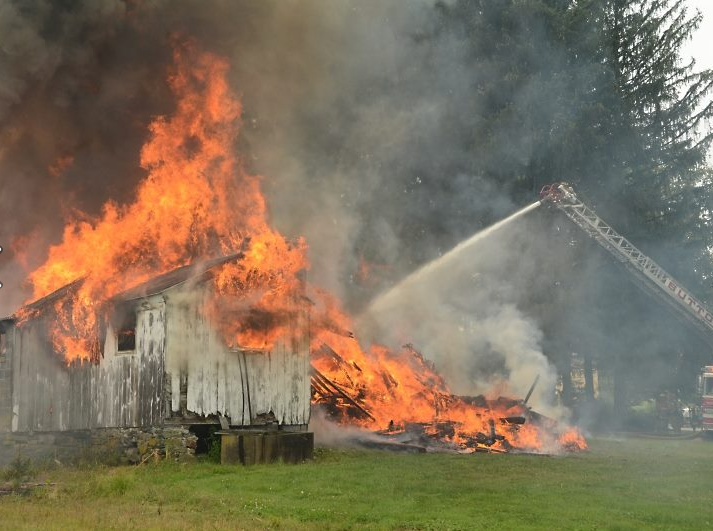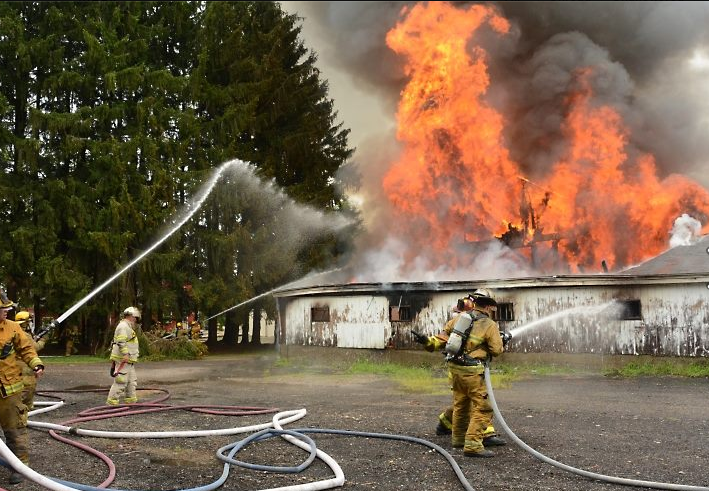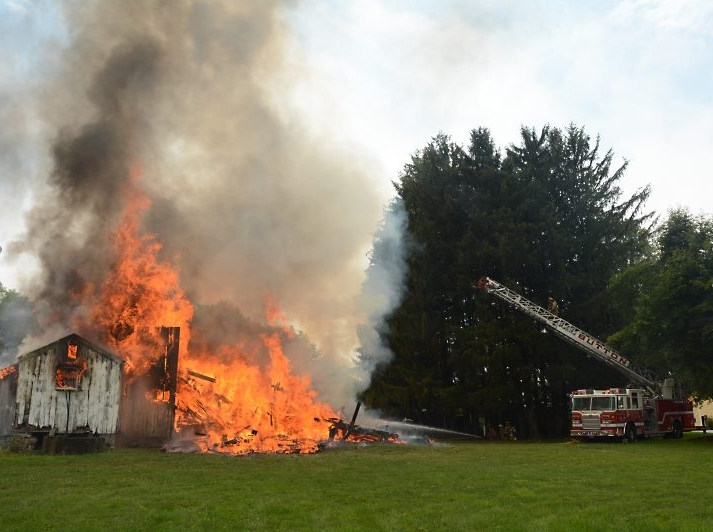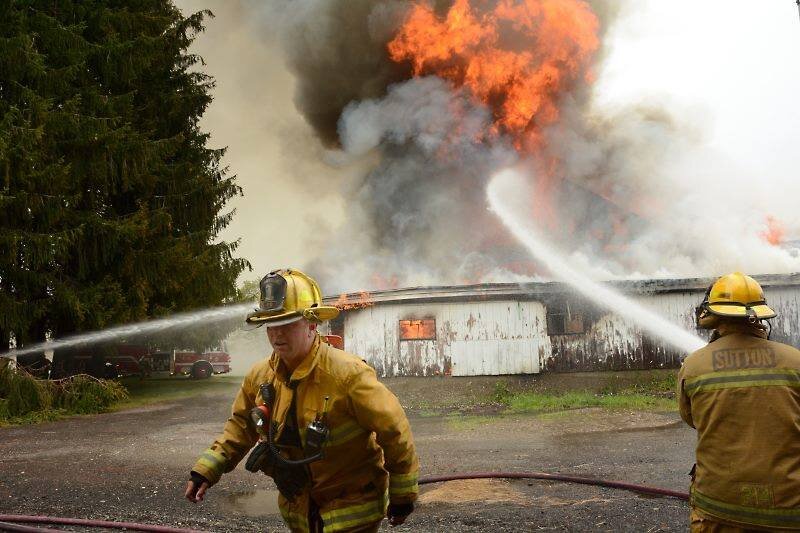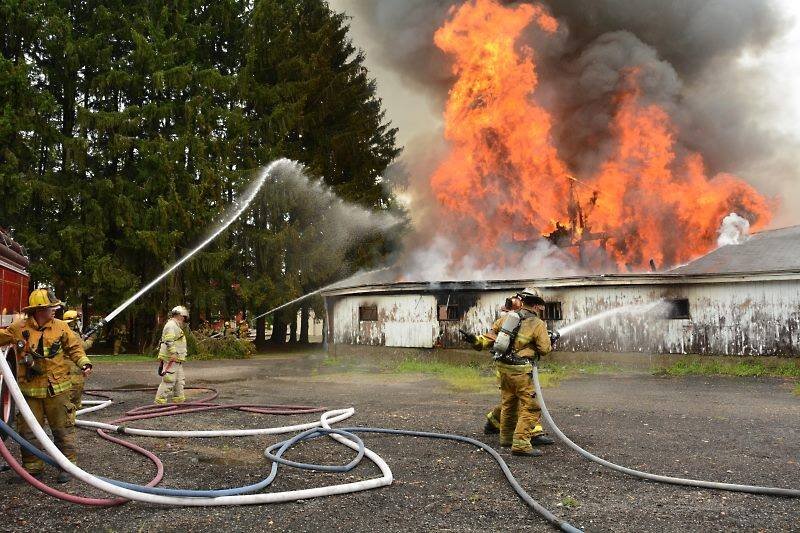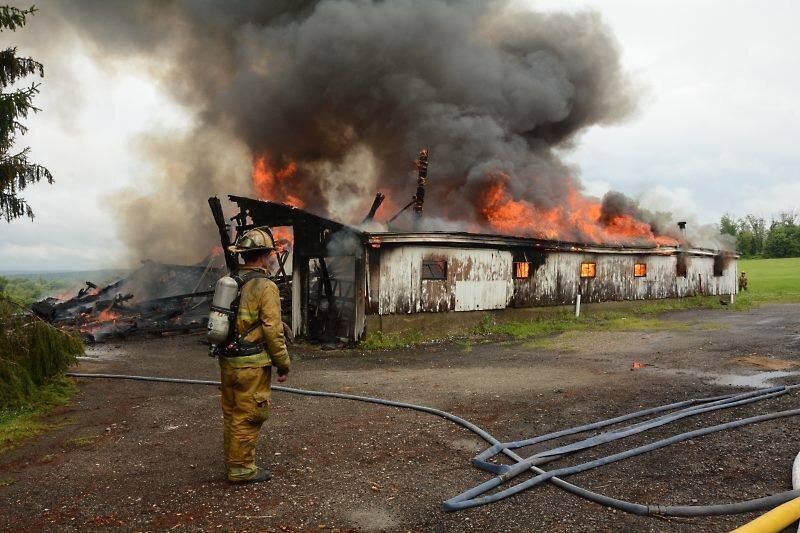Originally Published July 23, 2015 by Steve LeClaire
We lost more than a barn in Sutton last week. We lost volumes of unwritten Sutton history. Two hundred and fifty year’s worth of history - gone in a crack of lightning and condensed into less than an hour’s worth of smoke and flame. Sayings like “if only these walls could talk” and “if only the horses were listening and we could understand them” come to mind. Can you imagine what gems we’d hear if those sayings were true? Well, the witness may be gone, but the memories remain.
From its humble beginnings, the house and barns overlooking Clark’s Pond from the hill of Sutton Center was a noted landmark.
The place was originally Hale’s Tavern. It had a lengthy history as LeBaron’s Tavern. It was the most popular place between Boston & Hartford along the Post Road from the time of the American Revolution to before the American Civil War. Amongst the guests the aristocratic Lazarus LeBaron entertained were such important historical figures as General LaFayette and Governor John Hancock. I imagine all those famous people using LeBaron’s chamber pots and outhouse, and being heated by the forty plus cords of wood the tavern is said to have burned annually. Their horses most likely spent the night in the safety and comfort of the barn.
LeBaron’s only daughter Hannah and her husband, Captain Isreal Putnam had a thriving farm there. Theodore Putnam is said to have kept the place “in a fine state of cultivation with a fine stock of cattle – preparing most of his own fertilizers”.
To be sure, the insurance settlement ( and further financial hit on current owner George’s Funari’s wallet ) will certainly show it was George Funari’s showplace home of the 21st century when the barn burned down last week. And George certainly restored the place to its former beauty and glory, putting his own unique personality and stamp on the farm as well as becoming part of the fabric of Sutton. But to me and my generation, it was and will forever be known as “Wally’s place”.
Wally Johnson was a Swede from ‘the village’ in Worcester, but his mother was an Eaton from Sutton where he was born. As a boy, he was sent to work at “The Putnam Place” in Sutton Center, where he met, courted and married Charlie Putnam’s daughter Shirley. By marrying Shirley Putnam, he came to the large farm on the hill and set up housekeeping. Farming blood was in Wally’s veins, and he continued to farm. The original part of the barn dated back to the 1700’s. It was an English style barn where the entrance doors were along the long side, instead of the gable end as we know most barns today. Wally did a lot of renovating, adding, cutting, and pasting as was needed at the time. Over the course of many years, the profile and roofline of the barn changed and adapted to the needs of its owners. The original part of the barn became the enclosed, dark and cavernous recesses where the ( seemingly ) thousands of hay bales were stored. It was hot in there.
As a young newspaper delivery boy in the 1960’s, I loved to make my delivery to Wally & Shirley’s Farm. Shirley often set me up with milk and cookies, and I’d often poke my head into Wally’s barn to wave hello as Wally milked a couple cows or tended to his horses. Wally’s barn was where the action was; where huge Belgian horses were bred, where John Deere tractors were kept, where endless loads of hay were unloaded and where lively political discussions were held. Tobacco was chewed ( and spit ), beer was sometimes quaffed after haying, and curse words were sprinkled liberally in conversation. Metal was hammered and boards were sawed. It smelled of hay and grain, sweat and manure. It was a place of men, but we kids were always welcomed. Wally and Shirley never had any children of their own. However, he was ‘Uncle Wally’ to his nieces Joyce & Barbie, all their friends and half the extended town.
As many know, Wally was a 40 year selectman in Sutton. What many don’t know is that his unofficial ‘office’ was his barn. He often held ‘meetings before the meetings’ in his barn. In this way he was never blindsided at the official Town Meeting or Selectman’s meetings, and everyone’s position on a matter could be agreed on. In today’s climate of open meeting law this method of barnyard politics would probably never fly, but the best interests of the Town were always cultivated in the barnyard. If someone approached Wally with a problem or question, his response was often “drop by the barn and we’ll talk about it”. Wally loved Sutton. I can still hear him at town meeting, speaking from the Selectman’s table “Now, I could be wrong, but . . . “ He’d then state his position, or opposition and make his point. Either way, it was always colorful. Wally left Sutton for World War II and the European theater from Sutton. I can imagine him kissing Shirley before leaving, and kissing her a bit more affectionately on his return. He adored Shirley.
Wally soon filled his barn with Belgian horses. He purchased his first team from two Amish brothers of Farmerstown, Ohio - beginning friendships and strong connections with the Amish that last to this day. Had the barn burned while Wally owned it, within a week there probably would have been fifty Amish men on a bus headed to Sutton to reconstruct the barn by hand. Many an Amishman spent the entire summer at Wally’s, helping with chores and breeding and training the horses. Wally made many trips to Ohio to visit, buy and sell horses as well.
The barn always had a rooster. Henry the Rooster was pure evil. He delighted in surprising who ever got too close by raising in the air and slashing with his sharp spurs. Wally was gashed and bloodied more than once, and Henry felt the wrath of Wally’s boot more than once. Over the years, I think Henry got in more licks than Wally. There may have in fact been a succession of roosters named Henry. For years I thought the rooster’s name was ‘Son Of A Bitch’.
The wagon train to benefit Waters Farm gathered behind Wally’s barn and departed from there in 1988. There, underneath the barn sign of “Longueview Farm” Wally again kissed Shirley goodbye as he boarded his covered wagon and left on the ten day journey to Livermore, Maine. He coaxed his team of Belgians ahead by snarling “giddap!” With nothing but a wool army blanket and no mattress , he slept on the hard wood floor the of the wagon during the journey in the heat of July. He was seventy years old. The toughest son of a bitch I’d ever seen.
Wally let me host several years of Civil War encampments in and around his barnyard in the late 1990’s. The camps were set up in his adjoining fields, and open to the public. He supplied hay for the soldiers to sleep on from his barn. Wally was given the honor of raising the flag in the camps on several mornings. It was a ceremony he relished and performed with the solemn dignity and pride of his army service. One night around the ‘civil war’ campfire, we watched as a pair of headlights drove through the field - an anachronism and intrusion into our pretend 19th century world. The headlights drove right up to the campfire. It was Wally & Shirley, who sat in the car holding hands as they listened to the music and singing around the campfire. I heard one soldier ask with slightly indignation “Who does that guy think he is?” and another answered, “ He doesn’t think he’s anybody. That’s Wally Johnson. He owns this place you’re a guest on”.
As I got older ( and as Wally got older and needed more help ) I became part of his volunteer haying crew. Wally had started a tradition of hosting a very informal ‘Farmer’s Lunch’ on Saturdays. After a few pearls of wisdom and review of town events from Wally, we’d receive a few slices of cold cuts on a couple slices of bread washed down by a glass of room temperature soda. We’d adjourn to the barn to take down the week’s supply of feed hay. During the summer months we’d help Wally bale and put in his hay. The socializing in the barn tradition amongst men continued on.
It was after haying one late summer afternoon that a ferocious storm rolled in. We’d just sent the last bale up the elevator, beating the rain by mere seconds as the thunder rolled and growled closer. Most of the help scattered for the dry interior of their pickups and left. But Wally, Bob Largess, Dan Moroney and I took shelter and got caught in the open sided carriage shed to the west of the barn. We watched as the water poured in sheets off the barn roof. Fortunately Largess had taken the cooler of beer with him. We sat and watched the rain. Wally, never one to drink in excess, decided to have a beer. As the rain poured, one turned in to two, and the stories started to flow from Wally much like the streams of water now running through the barnyard.
He talked about getting drunk the night before his wedding with his friend Roy Potter. Roy somehow convinced Wally that he had time, and that it would be OK to go grab a drink at a local watering hole. Wally came home in time to milk the cows, and with his head pounding, fell asleep leaning against one of the cows. “This old coconut felt pretty good against that soft cow.” He said pointing to his head. He almost missed his own wedding. He jokingly added in his usual self- deprecating manner, “You know…you can always tell a Swede, but you can’t tell him much!”
He talked of shoeing the last team of oxen in the Sherman Blacksmith Shop with Lewis Sherman after the hurricane of 1938. Wally was all of 21 years old. Lewis Sherman and Wally were lifelong friends and farmer neighbors. They were hauling logs out of Purgatory Chasm, and only oxen could handle the heavy work. Wally was sent to get “the bulls” to receive new shoes. While being shod, one of the oxen unleashed a steaming load of manure down the neck of the kneeling Lewis Sherman, and Wally had to stifle his laughter. “Laugh, you little bastard, laugh!” was all Lewis could say.
Then, for whatever reason, Wally started to talk about his experiences in the war. He’d been a medic. I asked him what rank he’d attained, and he spit and answered, “just a buck private, that’s all”. But he started to talk about the Battle of the Bulge, and how he’d been in the thick of it. The thunder boomed overhead. He talked of the bitter cold of the foxholes. These were stories none of us had ever heard. He talked of using the coats of ‘dead Krauts’ for blankets, and using the dead Krauts themselves for cover. He talked of kicking the dead Krauts off the bridge crossing The Rhine River. There were anecdotes he related that no man should ever have to go through. He talked about the cries of the wounded and how he could help some, and others he couldn’t. “I didn’t know nothin’, just what they taught me” was all he could say.
The thunder clapped hard. Wally said, “You know, one of these days the god damned lightning will probably get that barn.“ I asked him what he’d do. “Shout Alleluia!” he said without missing a beat, but then added “I hope I ain’t around to see it though. You know? Some people might say this is all crap. All junk “, as he waved his arm in the general direction of the barn and some equipment rusting along the brush line. “But I can look out the window and say it’s MY junk. And that’s the way it ought to be. That barn meant work, but it was work I always loved and looked forward to. “
Who could ask for anything more?
